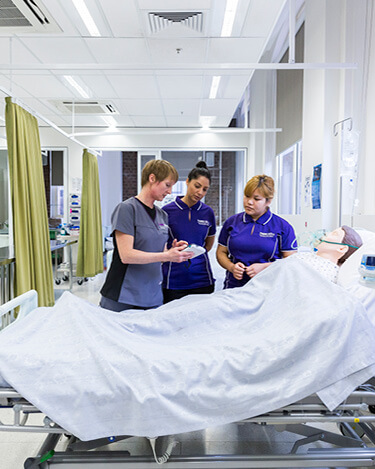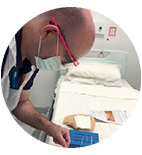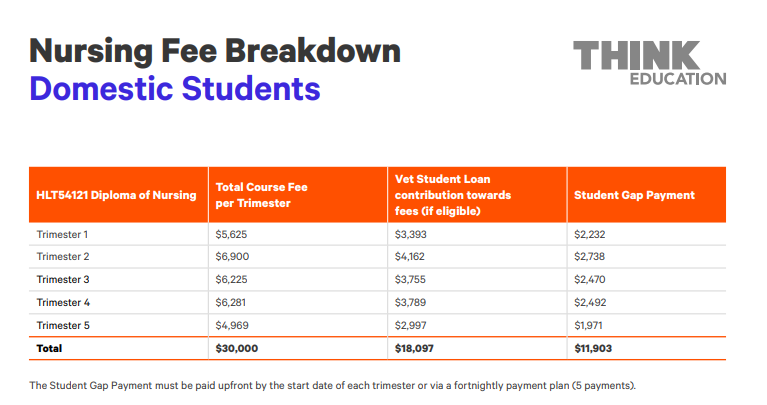HLT54121 Diploma of Nursing

This course is provided and delivered by Think: Colleges Pty Ltd.
What is a HLT54121 Diploma of Nursing?
The Diploma of Nursing will prepare you for a career as an Enrolled Nurse (EN) in the Australian healthcare environment. You will learn vital skills in assessment, clinical decision-making, person-centred care, professional communication, enquiry and research, awareness of diversity and self-care practices.
This course incorporates training in clinical simulation labs and 400 hours of clinical placements. During your studies, you will have the opportunity to gain competence in delivering care in multiple healthcare industry and community settings.
Taking enrolments for Brisbane Campus Trimester 1 2024.
Learning outcomes
- Integrity in the pursuit of knowledge - Employability through industry recognised learning
- A reflexive, globally focused curriculum
- Access to a global network of facilities and connections
- Proactive engagement with industry globally
- Collaboration, teamwork and partnership
- Learning flexibility at every point
- Inter-cultural understanding and respect
- Intellectual and personal welfare of all staff and students
Career opportunities
Upon successful completion of the HLT54121 Diploma of Nursing, you will be eligible to apply for registration with Australian Health Practitioners Agency (AHPRA) as an Enrolled Nurse.
Career paths
- Acute care;
- Emergency services;
- Operating theatres;
- Day Surgery Centres;
- Chronic care;
- Palliative care;
- Aged care;
- Pediatrics;
- Rehabilitation services;
- Community health;
- Primary health including Aboriginal Medical Centres, General Practices and Specialist Practices;
- Mental health;
- Psychiatric, forensic and correctional health;
- Refugee health;
- Rural and Regional health services;
- Health Promotion;
- and Digital health.
-
Future careers
- Acute care;
- Emergency services;
- Operating theatres;
- Day Surgery Centres;
- Chronic care;
- Palliative care;
- Aged care;
- Pediatrics;
- Rehabilitation services;
- Community health;
- Primary health including Aboriginal Medical Centres, General Practices and Specialist Practices;
- Mental health;
- Psychiatric, forensic and correctional health;
- Refugee health;
- Rural and Regional health services;
- Health Promotion;
- and Digital health.

Subjects and units
All the units of competency for this qualification including core and elective units are listed below (Table 1). All electives chosen must contribute to a valid, industry-supported vocational outcome. Core competency units cannot be substituted. https://training.gov.au/Training/Details/HLT54121
Total number of units = 25
- 20 core units
- 5 elective units, consisting of:
- 3 units from the list below
- 2 units from the list below, elsewhere in the HLT54121 Health Training Package, or any other current Training Package or accredited course.
The selection of electives must be guided by the job outcome sought, local industry requirements and the complexity of skills appropriate to the AQF level of this qualification.
The course structure, showing subjects can be viewed or download via the Student Hub.
International students on a student visa must not enrol into any more than a third or 33% of online subjects over their course and must study at least one subject that is face to face in each trimester.
International students on a student visa are required to study full time, i.e. the student must complete a minimum of 1.0 EFTSL of study per year.
-
Year 1
-
Year 2
-
Apply communication skills in nursing practice | HLTENN036
This unit describes the skills and knowledge required to apply effective communication skills with a person, family or carer and with other healthcare professionals in a variety of health care settings.
Communication skills in nursing practice require using information technology as well as interpersonal skills applied therapeutically in nursing care and small group discussions.
This unit applies to enrolled nursing work carried out in consultation and collaboration with registered nurses, and under supervisory arrangements aligned to the Nursing and Midwifery Board of Australia regulatory authority legislative requirements.
-
Use medical terms in health care | HLTCCD003
This unit describes the performance outcomes, skills and knowledge required to apply an understanding of medical terminology to interpret clinical documentation and communicate with health care professionals.
This unit applies to health care professionals who are responsible for interpreting patient clinical information for the purposes of providing health care services. Work may be performed as an individual or as part of a team under limited supervision.
The skills in this unit must be applied in accordance with Commonwealth and State/Territory legislation, Australian standards and industry codes of practice.
No occupational licensing, certification or specific legislative requirements apply to this unit at the time of publication.
-
Follow safe work practices for direct client care | HLTWHS002This unit describes the skills and knowledge required for a worker to participate in safe work practices to ensure their own health and safety, and that of others in work environments that involve caring directly for clients. It has a focus on maintaining safety of the worker, the people being supported and other community members. This unit applies to all workers who require knowledge of workplace health and safety (WHS) to carry out their own work, in both centre-based and home-based service provision.
-
Confirm physical health status | HLTAAP002This unit describes the skills and knowledge required to obtain and interpret information about client health status and to check a client’s physical health. It requires a detailed knowledge of anatomy and physiology.
-
Analyse and respond to client health information | HLTAAP003This unit of competency describes the skills and knowledge required to analyse client health information and then to plan appropriate health services within scope of own role. It requires an in-depth knowledge of anatomy and physiology.
-
Provide end of life care and a palliative approach in nursing | HLTENN068
This unit describes the performance outcomes, skills and knowledge required to provide a person-centred approach to palliative and end of life care in primary health care, hospitals, hospices, home and community care, and long-term care facilities.
This unit applies to enrolled nursing work carried out in consultation and collaboration with registered nurses, and under supervisory arrangements aligned to the Nursing and Midwifery Board of Australia regulatory authority legislative requirements.
-
Apply basic principles and practices of infection prevention and control | HLTINF006
This unit describes the skills and knowledge required to follow organisational infection prevention and control procedures, including implementing standard and transmission-based precautions and responding to infection risks.
This unit applies to individuals working in health and direct client care contexts.
-
Apply legal and ethical parameters to nursing practice | HLTENN041
This unit describes the skills and knowledge required to within work legal and ethical parameters in professional nursing practice, including supporting rights and meeting duty of care requirements.
This unit applies to enrolled nursing work carried out in consultation and collaboration with registered nurses, and under supervisory arrangements aligned to the Nursing and Midwifery Board of Australia regulatory authority legislative requirements.
-
Implement and monitor care of the older person | HLTENN045
This unit describes the performance outcomes, skills and knowledge required to perform nursing interventions to support the social and emotional wellbeing and nursing care needs of the older person in care.
This unit applies to enrolled nursing work carried out in consultation and collaboration with registered nurses, and under supervisory arrangements aligned to the Nursing and Midwifery Board of Australia regulatory authority legislative requirements.
-
Implement, monitor and evaluate nursing care plans | HLTENN038This unit describes the skills and knowledge required to implement nursing care as outlined in a person’s plan of care, evaluate outcomes of care provided, record and report progress, and respond to an emergency situation. This unit applies to enrolled nursing work carried out in consultation and collaboration with registered nurses, and under supervisory arrangements aligned to the Nursing and Midwifery Board of Australia regulatory authority legislative requirements.
-
Practice nursing within the Australian health care system | HLTENN035This unit describes the skills and knowledge required to practise as a nursing professional within the Australian health care system, providing health care across the lifespan of people in a range of health and community care services or environments.
-
Perform clinical assessment and contribute to planning nursing care | HLTENN037This unit of competency describes the skills and knowledge required, within the scope of practice, to perform preliminary and ongoing physical health assessments of all body systems, gathering data that contributes to a person’s individualised health care plan. This unit applies to enrolled nursing work carried out in consultation and collaboration with registered nurses, and under supervisory arrangements aligned to the Nursing and Midwifery Board of Australia regulatory authority legislative requirements. The skills in this unit must be applied in accordance with Commonwealth and State/Territory legislation, Australian/New Zealand standards and industry codes of practice.
-
Work with diverse people | CHCDIV001This unit describes the skills and knowledge required to work respectfully with people from diverse social and cultural groups and situations, including Aboriginal and/or Torres Strait Islander people. This unit applies to all workers. 40 nominal hours.
-
Apply principles of wound management in the clinical environment | HLTENN039This unit describes the skills and knowledge required to apply contemporary wound management principles to the care of various types of wounds. It involves working with the interdisciplinary health care team to contribute to assessment, treatment and ongoing management of a person’s wounds.
-
Manage personal stressors in the work environment | HLTWHS006
This unit describes the skills and knowledge required to maintain health and wellbeing by preventing and managing personal stress.
This unit applies to work in a range of health and community services settings, in particular work roles that operate in high stress situations and circumstances.
The skills in this unit must be applied in accordance with Commonwealth and State/Territory legislation, Australian/New Zealand standards and industry codes of practice.
-
Respond to client language, literacy and numeracy needs | CHCLLN001
This unit describes the skills and knowledge required to identify situations where client language, literacy and numeracy (LLN) skills may be impeding access to services, to adjust service delivery, and to refer appropriately to improve client outcomes.
The unit does not provide workers with the skills and knowledge to identify LLN skill levels or to actively intervene in developing a client’s LLN skills.
This unit applies to individuals who may be making individual client assessments or managing caseloads as part of their work role.
-
Reflect on and improve own professional practice | CHCPRP003
This unit describes the skills and knowledge required to evaluate and enhance own practice through a process of reflection and ongoing professional development. This unit applies to workers in all industry sectors who take pro-active responsibility for their own professional development.
The skills in this unit must be applied in accordance with Commonwealth and State/Territory legislation, Australian/New Zealand standards and industry codes of practice.
-
Apply nursing practice in the primary health care setting | HLTENN047
This unit describes the nursing skills and knowledge required to work in a primary health care environment including community-based, educational, occupational and informal settings, and in general practice.
Primary health care involves a person-centred and comprehensive approach to health care. It is made accessible to people by being located as close as possible to where they live, and supporting their full participation in a spirit of self-reliance and self-determination.
This unit applies to enrolled nursing work carried out in consultation and collaboration with registered nurses and under supervisory arrangements aligned to the Nursing and Midwifery Board of Australia regulatory authority legislative requirements.
-
Implement and monitor care for a person with mental health conditions | HLTENN042This unit describes the performance outcomes, skills and knowledge required to contribute to the nursing care and treatment of a person with a mental health condition. This unit applies to enrolled nursing work carried out in consultation and collaboration with registered nurses, and under supervisory arrangements aligned to the Nursing and Midwifery Board of Australia (NMBA) regulatory authority legislative requirements. The skills in this unit must be applied in accordance with Commonwealth and State/Territory legislation, Australian Standards and industry codes of practice.
-
Implement and monitor care for a person with chronic health conditions | HLTENN044
This unit describes the performance outcomes, skills and knowledge required to meet the assessed health care needs of people with chronic health conditions.
This unit applies to enrolled nursing work carried out in consultation and collaboration with registered nurses, and under supervisory arrangements aligned to the Nursing and Midwifery Board of Australia regulatory authority legislative requirements.
-
Administer and monitor medicines and intravenous therapy | HLTENN040This unit describes the performance outcomes, skills and knowledge required to administer and monitor medicine and intravenous (IV) therapy including calculating dosage requirements, reading and applying written instructions from an authorised prescriber, assessing the person for medicine effectiveness and side effects, and responding to an allergic pharmacological reaction. This unit applies to enrolled nursing work carried out in consultation and collaboration with registered nurses and under supervisory arrangements aligned to the Nursing and Midwifery Board of Australia (NMBA) regulatory authority legislative requirements. The skills in this unit must be applied in accordance with Commonwealth and State/Territory legislation, Australian Standards and industry codes of practice. No occupational licensing, certification or specific legislative requirements apply to this unit at the time of publication.
-
Implement and monitor care for a person with acute health conditions | HLTENN043This unit describes the performance outcomes, skills and knowledge required to meet the assessed health care needs of people with acute health conditions. This unit applies to enrolled nursing work carried out in consultation and collaboration with registered nurses, and under supervisory arrangements aligned to the Nursing and Midwifery Board of Australia (NMBA) regulatory authority legislative requirements. The skills in this unit must be applied in accordance with Commonwealth and State/Territory legislation, Australian Standards and industry codes of practice. No occupational licensing, certification or specific legislative requirements apply to this unit at the time of publication.
-
Promote Aboriginal and Torres Strait Islander cultural safety | CHCDIV002The unit describes the skills and knowledge required to identify Aboriginal and/or Torres Strait Islander cultural safety issues in the workplace, model cultural safety in own work practice, and develop strategies to enhance cultural safety. This unit applies to people working in a broad range of roles including those involved in direct client service, program planning, development and evaluation contexts.
-
Contribute to the nursing care of a person with diabetes | HLTENN057
This unit describes the performance outcomes, skills and knowledge required to provide nursing care to a person with diabetes including assessing needs, planning and implementing nursing interventions, evaluating outcomes, and educating the person on the condition and available resources.
This unit applies to enrolled nursing work carried out in consultation and collaboration with registered nurses, and under supervisory arrangements aligned to the Nursing and Midwifery Board of Australia (NMBA) regulatory authority legislative requirements.
-
Research and apply evidence to practice | CHCPOL003
This unit describes the skills and knowledge required to establish the information need, gather information and critically analyse the information for relevance to own work.
This unit applies to health and community service workers who need to research existing information to support and improve their work practice. It does not cover primary research.
The skills in this unit must be applied in accordance with Commonwealth and State/Territory legislation, Australian/New Zealand standards and industry codes of practice.
Industry partners and work placements
Are you Domestic or International?
Choose your student type for fees, scholarships and entry requirements
-
Domestic
-
International
Fees
-
Domestic fees
Check the Domestic Course Fee Schedule for the cost of your course. Fees for each trimester must be paid before the trimester commences.
-
VET Student Loans (VSL)
You can apply for VET Student Loan (VSL) if you are eligible. VET Student Loan (VSL) is a Commonwealth Government loan scheme that assists students to pay a part of their VET tuition fee.
-
Subsidised training (South Australia)
Eligible South Australian students’ course fees are partly covered by the Government under the South Australian subsidised training scheme. Students eligible for subsidised training in SA: $10,500.
*Please note for VET Student Loans (VSL):
- VET student loans will not be approved for students who do not meet eligibility requirements
- VET student loan gives rise to a VETSL debt that continue to be a debt due to the Commonwealth until it is repaid.
Scholarships
We offer a variety of Health scholarships to help you become a key player in the industry.
-
Scholarship types
Admissions criteria and pathways
Guaranteed pathway and Recognition of Prior Learning
If you have already completed a qualification, you may be able to credit this against your study with us, even if it’s from another institution. This is called Recognition of Prior Learning. The HLT54121 Diploma of Nursing provides a pathway to the Bachelor of Nursing, offered by Torrens University Australia. To find out more, visit Bachelor of Nursing.How to apply
Read through the admissions criteria and ensure you meet the entry requirements.
Apply
Submit your application online or contact us for assistance.
Offer
We’ll contact you shortly after to confirm your details and help you through the rest of the process.
Fees
-
International fees
Check the International Course Fee Schedule for the cost of your course. Fees for each trimester must be paid before the trimester commences. Onshore international students requiring a student visa should choose campus-based/blended options.
-
How to pay
Course fees can be paid in three instalments, each to be paid before the beginning of the academic stage census date.
Scholarships
We offer a range of financial scholarships, designed to support you on your study journey.
-
Scholarship types
Admissions criteria and pathways
AND Undertake Language, Literacy and Numeracy (LLN) testing from an Australian Government approved provider and demonstrate competency at exit level 3 in the Australian Core Skills Framework (ACSF) in both reading and numeracy.
Contact the International Admissions team for more information.
Guaranteed pathway and Recognition of Prior Learning
If you have already completed a qualification you may be able to credit this against your degree with us, even if it’s from another institution. This is called Recognition of Prior Learning. We also offer pathway opportunities to further your learning. Learn more about study pathways.How to Apply
Read through the admissions criteria and ensure you meet the entry requirements.
You can apply via an International Education Agent, or submit an EOI and documentations to the Enrolment Support team.
Frequently asked questions
-
How do I apply for a course?Domestic students
Check the entry requirements for the course you’re interested in and submit an online application.
If you have any difficulty, please contact a Course and Careers Advisor, who can talk you through the process.
International students
You can apply to Think Education through one of our Education Agents. Our agents are located throughout the world and will make sure the enrolment process runs smoothly. You can also apply online.
View the full list of Education Agents
For anything else, please contact our International recruitment team at study@torrens.edu.au.
-
What are the payment options? What are FEE-HELP and VET Student Loan (VSL)? Am I eligible?
Payment options available include:
- Upfront payment via Flywire, credit card, BPAY or overseas bank account transfer.
- You can also apply for a payment plan if you are a domestic student.
Financial assistance
- If you’re a domestic student and looking to study our Bachelor of Health Science (Clinical Myotherapy), you may be eligible for FEE-HELP.
- If you’re a domestic student and looking to study our, Diploma of Nursing you may be eligible for VET Student Loan.
- Your eligibility for FEE-HELP and VET Student Loan depends on criteria such as your citizenship status, and whether you’re looking to study a undergraduate, postgraduate of vocational education program.
- Check your eligibility on the Australian Government’s Study Assist website.
-
Where can I study?
If you are looking to study our Diploma of Nursing, you can study in Sydney at our Surry Hills campus; in Melbourne at our Flinders Street campus; in Brisbane at our Gotha Street campus; and in Adelaide at our Wakefield Street campus.
-
What are Recognition of Prior Learning (RPL) and Credit Transfer (CT)? How do I apply?
Recognition of Prior Learning is an assessment process that recognises experience, previous study and qualifications, and other forms of informal and non-formal learning, to determine if you meet course requirements.
If you have relevant qualifications or experience, eligible for credit towards your course and a reduction in tuition costs.
Please speak to one of our Future Student Advisor to advise them on the experience or previous study you have.
-
What scholarships do you offer and how do I apply?
As well as Health scholarships, we offer a wide range of scholarships for domestic and international students, including Industry and Indigenous scholarships.
Domestic students
When you speak to one of our Course and Careers Advisors, let them know you wish to be considered for a scholarship in your application form. They will show you how to apply for a scholarship.
International students
Please contact your education agent for further information, email us or call 1300 575 803. Visit our Scholarships page for more details on applying.
-
What is blended study?Blended study is a mix of in-person and online learning.
-
What do part-time and full-time study entail?A standard full-time study load is made up of three subjects (approximately 30 hours a week). Part-time study is made up of two subjects (approximately 20 hours per week).











